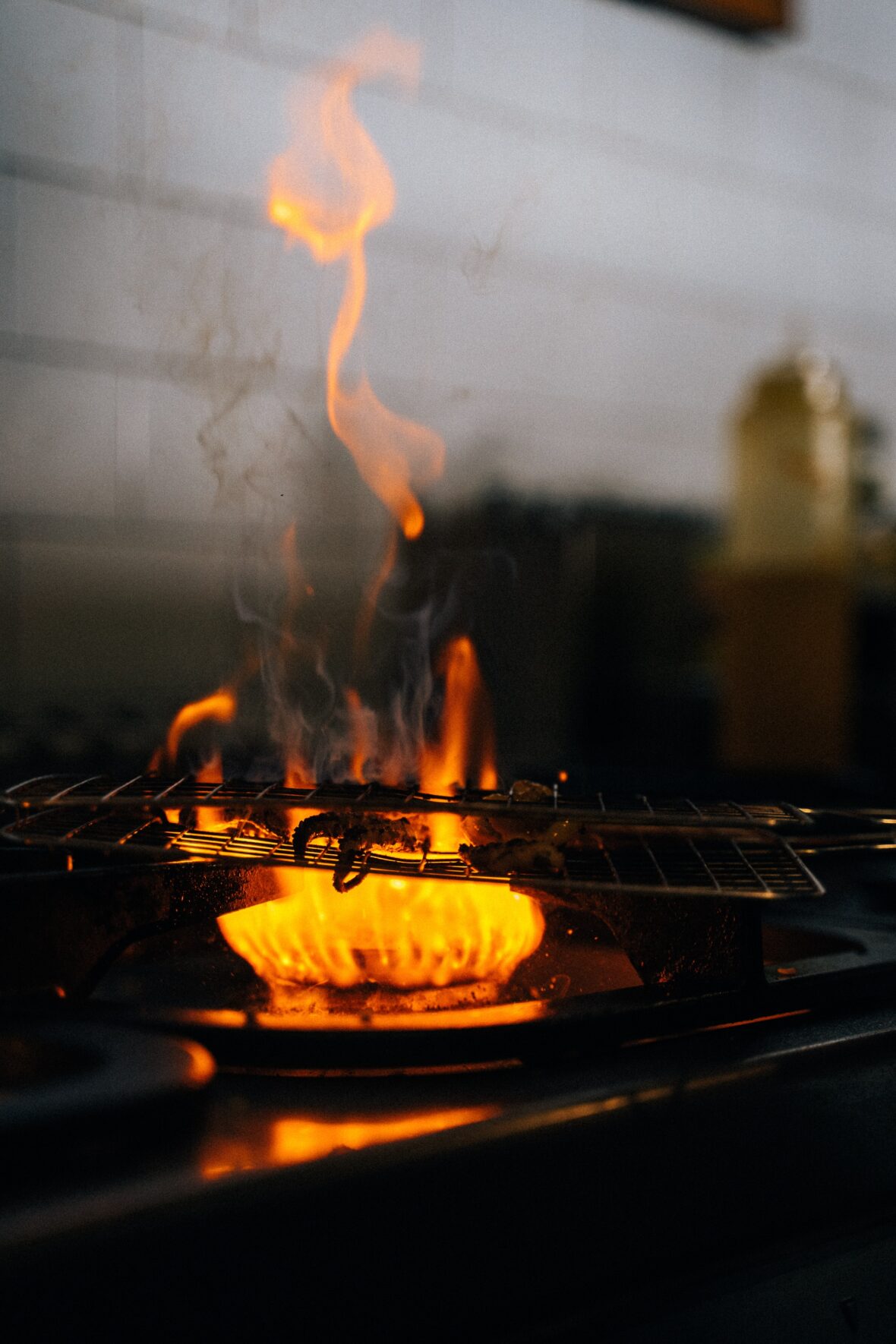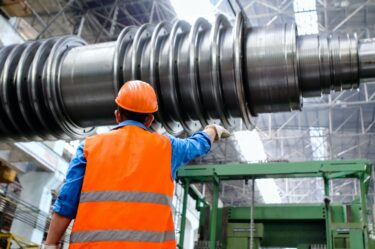If anyone should know how to prevent a kitchen fire, it’s Lieutenant Anthony Mancuso, director of fire safety with the FDNY. And yet there was that *one* time on vacation with his wife.…They set eggs in a pot of water on their timeshare’s stovetop before heading out to dinner. Except they forgot to turn off the heat. When they came back, the water had evaporated and the pot was completely burnt. (Thankfully, the fire didn’t spread and the building wasn’t damaged.) „We had to pay for the pot, and the timeshare owner noticed the badge on my ring. She asked what it meant and I had to admit I was with the FDNY.”
Let this be a lesson to us all: Your kitchen is a dangerous place, just waiting to combust into flames at any moment. That was our Stern Bolding—did it work? Are you reading this while two slices of leftover pizza are starting to singe in the oven? Stay alert! Here’s how to deal with a kitchen fire, according to Lt. Mancuso.
If something catches fire in the oven or broiler…
Do NOT open the oven door. Shut the whole thing off and back away. If you open the door, „You’ll burn your face or set your hair on fire,” warns Mancuso. Fire needs oxygen to thrive, and you’ll only be fanning the flames—literally—by opening the door. „The fire will eventually die down if you just turn the oven off,” he explains. Stay in the room and keep an eye on things through the window of your oven. Once it’s cooled completely you can clean things up.
If the fire’s on the stovetop…
A stovetop fire is a bit more dangerous, explains Mancuso. Remember that all fires need oxygen to burn, so your best plan of attack is to cut off the oxygen supply to the pan or pot. Keep a lid next to the oven in case of fire. Should flames erupt, snuff them before they get too large by just covering the pan. If that doesn’t work, pour baking soda (yes, you’ll need a lot) on the fire. This will stifle the flames. If that doesn’t work you have two options: Call the fire department or use your fire extinguisher.
Did you say…fire extinguisher?
You bet we did. You do have one, don’t you?
Um…
Okay. It’s definitely smart to keep a fire extinguisher in your kitchen. Mancuso recommends buying one marked with a „UL” symbol. They’re rated A (for basic „combustibles” like wood and paper), B (for oil and gas) and C (for electrical fires). You’ll want one that’s rated B, as most kitchen fires involve grease. Avoid smaller aerosol-style extinguishers (they look like cans of hairspray), as they require you to get too close for comfort to the fire. To use the extinguisher, stand eight feet away from the fire and aim above the flames. Keep in mind that once you use an extinguisher, everything in your kitchen will need to be cleaned thoroughly. If you can tame the flames with a pot lid or baking soda, do that.
Any definite don’ts?
Never put water on a grease fire, says Mancuso. Never, ever, ever. It won’t adequately stifle the flames, and you’ll just be wasting precious time, allowing the fire to grow. No water.
At what point should you call the fire department?
„If you can’t isolate the fire, if it’s larger than a basketball, or if it’s spreading, call the fire department,” says Mancuso.
Hey, what’s the most common cause of kitchen fires, anyway?
„Everybody’s got these big, billowing sleeves,” says Mancuso with a tinge of disappointment. „And bathrobes. And scarves.” Basically, anything that dangles from your appendages = death trap. „A lot of people come home and start cooking before changing into safer clothing,” says Mancuso. „This one woman told me she walked away from the stove and felt very warm. ‘The end of my scarf was on fire!’ she said.”
What’s the most common food that starts kitchen fires?
Bacon. Steaks. Bacon. Anything that emits grease as it cooks and splatters. „Broilers also cause a lot of fires,” he says, „Because the food’s so close to the flames.” Another big offender? „Those bags of popcorn. People microwave them, open them, and realize not all the kernels popped. So they put it back in the microwave but people don’t know it will catch on fire if it’s open!”
Do you happen to have any more stories about firefighters setting stuff on fire?
„I worked with a guy a while back who went home, put something on the stove, and fell asleep. He woke up to firefighters in his apartment. Of course he wouldn’t tell them he was a firefighter himself.” And what about those big Sunday dinners firefighters cook up at the station? „They always burn the garlic bread,” says Mancuso. „They put it in the toaster oven or the broiler and think it’s gonna take forever so they don’t watch it.” Or, „they leave the oven on when we get a call, thinking the turkey’s just gonna keep cooking. But you come back and it’s caused a big fire.”
Whoa. Okay, any last horror stories to scare us into submission?
„We were once doing a safety presentation in an apartment that was overlooking St. Patrick’s cathedral,” says Mancuso. „The guy had a wall-mounted oven and inside he was storing bags of bread! He was like, ‘I don’t cook!’ but if you think about what would happen to that bread if he turned the oven on…” Another time, Mancuso responded to a call in which paint cans that were stored in the oven exploded all over the kitchen. The oven is not an extra closet!
Any last tips or pieces of advice?
Mancuso has the final words: „If you’re on your phone, I really hope you’re looking at a recipe and not texting.” Good call: 33 percent of kitchen fires are caused by unattended cooking.
Sursa: BonAppetite


